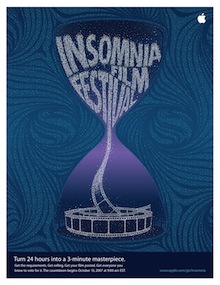 Apple is sponsoring a 24-hour film festival for high school and college filmmakers. If you fall into this demographic, absolutely do it. You get 24 hours to write, produce, edit, score and deliver a 3-minute short film incorporating specific elements they only announce on the day.
Apple is sponsoring a 24-hour film festival for high school and college filmmakers. If you fall into this demographic, absolutely do it. You get 24 hours to write, produce, edit, score and deliver a 3-minute short film incorporating specific elements they only announce on the day.
I’ve had the pleasure of being a judge for the equivalent contest at USC, and while many of the resulting films are terrible, they’re mercifully short. A handful end up being truly inspired.
Some advice, since I obviously want my readers to win:
1. Think about the most obvious ways to incorporate the required elements. Then don’t do those.
2. Avoid bad puns. If all you have to offer is a witty title, you won’t score.
3. Go funny. While there will no doubt be one or two dramatic shorts in the finals, the winner will be funny.
4. Don’t forget to write a script. It’s tempting to rush out and start shooting. Spend a few of those first hours writing. What is the story? How does it progress?
5. Sound matters more than picture. If we can’t understand your dialogue, you won’t win.
6. Lighting matters more than resolution. A cheap camcorder with thoughtful lighting is better than a Red One at noon.
7. Prepare to edit. You don’t want to get back to your computer only to find it’s impossible to get footage from the UDX-HR5 into the Mac.
8. Protein, not carbs. Because you’ll likely be working all night, sugar will send you into a crash.
9. Plan ahead to think of what locations, props and (most importantly) people you might have at your disposal. It’s also fine to think of general story ideas, but don’t get locked into anything. If the required elements feel tacked-on rather than integral, you won’t win.
10. Lock your picture edit with enough time to tweak sound and music.
Other thoughts and suggestions? Add them in the comments.
(Thanks to [Daring Fireball](http://daringfireball.net) for the link.)